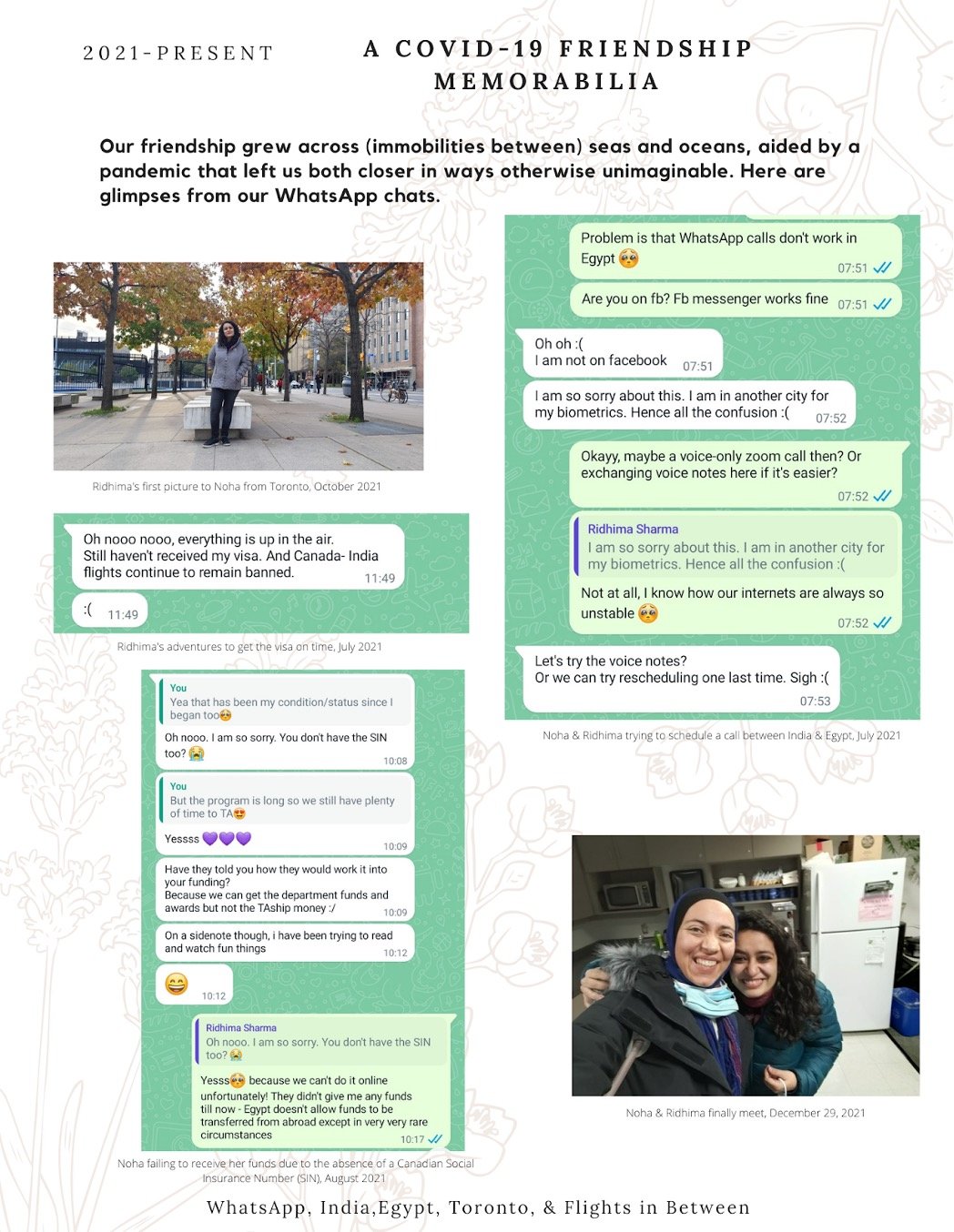Why Canada? Academic (Im)mobilities and the Making of a Friendship
By Noha Fikry (University of Toronto) and Ridhima Sharma (University of Toronto)
Both authors contributed equally to the work. Author names are in alphabetical order.
Noha and Ridhima reflect on their journey as “international students” from Egypt and India—from graduate-program applications to their arrival in Canada. Noha responds to the oft-encountered “Why Canada?” Ridhima reflects on her ongoing journey post-arrival. Their friendship has to do with many things, but the shared struggle with borders and bureaucracy of a foreign country as international students was perhaps the first thing that helped them develop a common language and ethic of friendship.
Noha: Many first conversations with colleagues begin with “Why Canada?” This comes as a strange question because there is no subtle way to say, “As if I have the luxury of choice?” The bitter reality of “Why Canada?” takes the following shape: A financial decision to invest in applications to a number of programs, the monetary amount of which is shocking to most international students. We decide the number of applications based on what we can afford, alongside GREs and potential retakes. “Why Canada?” boils down to who responds to countless emails we send to professors as we hope for affirmative replies without a subtle or blunt “unfortunately, given COVID-19, your chances of getting accepted as an international student are limited.” Omit COVID-19 and the sentence often remains unchanged. Why Canada? Because this is the only place that accepted my application alongside eight rejections from universities in other countries, a state of affairs that would have been different had I not been “international.” Being “international” means being immobile, having little choice in where you end up as a graduate student.
Ridhima: One would think it gets easier after “acceptance” from a university of choice. In many ways, it does. And yet, it is only the beginning to being marked in other ways. Three months of waiting for a medical request because students from “certain” countries need one before arrival to Canada. Six months just to receive a study permit. Navigating flight bans via third-country routes. Moving to a “foreign” continent in the middle of a semester and in the thick of a pandemic. Being issued an erroneous study permit and having to reapply. Individual inconveniences? Perhaps. But also, some are more susceptible to certain “inconveniences” than others because geopolitical structures, borders, and bureaucracies are built for certain accidents to happen more often to certain people from certain locations. Still learning what it means to be marked as an “international student.” On the one hand, it is a homogenizing label that erases my privilege and access to get here in the first place. On the other, it is an assigned bureaucratic identity that shall determine many of the ebbs and flows of my journey for the next many years. Hopefully, the fun and joy of a PhD (there is such a thing!) will outshine the bureaucratic acrobatics emerging from structural inequalities.
Excerpts from WhatsApp conversations and pictures before and after Noha and Ridhima met in December 2021.
BIOS
Noha Fikry is a PhD student of anthropology with a specialization in food studies at the University of Toronto. She is interested in human-animal relations, food, and hospitality. Noha’s PhD research explores relations of women farmers to the animals they rear at home and eat or sell in rural Egypt.
Ridhima Sharma is a PhD student in the Department for the Study of Religion at University of Toronto, working at the intersection of the anthropology of religion, gender studies, and the ethnography of the nation-state. Her current research explores the material and discursive underpinnings of Hindu nationalist practices couched as seva, or charitable service, in the North Indian state of Haryana.
